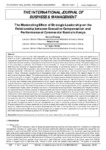| dc.contributor.author | Masaga, Barante | |
| dc.contributor.author | Arasa, Robert | |
| dc.contributor.author | Nzioki, Susan | |
| dc.date.accessioned | 2021-07-06T14:59:24Z | |
| dc.date.available | 2021-07-06T14:59:24Z | |
| dc.date.issued | 2019-09-01 | |
| dc.identifier.issn | 2321–8916 | |
| dc.identifier.uri | http://ir.mksu.ac.ke/handle/123456780/8010 | |
| dc.description.abstract | Boards of Directors are not only held responsible for an organization’s failure to conform to rules and regulations or
failure to attain organizational performance goals, they are also supposed to remunerate and monitor company
management’s performance. The purpose of this study was to examine the moderating effect of Strategic leadershipon the
relationship between executive compensation and the performance of commercial banks in Kenya. The specific objectives
of this study were: to establish the influence of Share ownership on the performance of commercial banks in Kenya; to
determine the influence of Executive perks on the performance of commercial banks in Kenya; to determine the
relationship between Bonus payment and performance of commercial banks in Kenya; to examine the extent to which
strategic leadership moderates the relationship between executive Compensation and the performance of commercial
banks in Kenya. This study was anchored on Contingency theory and Stewardship theories. The research design for the
study was correlational design. The target population was all operational registered commercial banks in Kenya which
are thirty-nine (39) in number; the sample size was obtained using purposive sampling technique where the respondents
were the Chief Executive Officers (CEOs) of each bank and one executive director for each bank giving a total sample size
of 78. Data was collected using questionnaires. Ordinal logistic regression analysis was performed on the data collected
using R technique to estimate and provide empirical evidence on the nature of relationship between compensation system
and bank performance. The research hypotheses were tested by determining the significance of the regression coefficients
of the estimated models. Share ownership was found to have a positive and significant relationship with the performance
of commercial banks in Kenya; payment of executive perks was found to have a positive and significant relationship with
the performance of commercial banks in Kenya, embracing strategic leadership by the board was found to positively
influence the relationship between executive compensation and the performance of commercial banks in Kenya. Based on
the findings, the study recommends that; Banks should establish a system of compensation that is performance based and
top executive should be allowed share ownership of these banks, this will induce the top management to align their
interests to the interest of these banks and subsequently work to improve the performance of these banks; Banks should
pay competitive executive perks to the top management as a way of motivating good performance; Banks Boards of
Directors should offer strategic leadership by drawing strategic plans detailing clear strategic objectives on key areas of
operation, disseminate the same to all bank employees with the view to having them buy in and direct their efforts to
areas that are productive. Banks should employ people with strategic orientation especially at the top-level management
and invest resources in developing capacity for strategic leadership | en_US |
| dc.language.iso | en | en_US |
| dc.publisher | THE INTERNATIONAL JOURNAL OF BUSINESS & MANAGEMENT | en_US |
| dc.subject | Executive compensation, firm performance, stewardship theory, strategic leadership | en_US |
| dc.title | The Moderating Effect of Strategic Leadership on the Relationship between Executive Compensation and Performance of Commercial Banks in Kenya | en_US |
| dc.type | Article | en_US |

